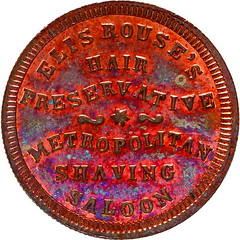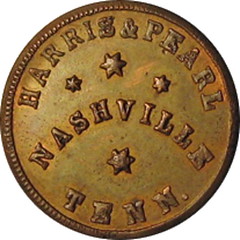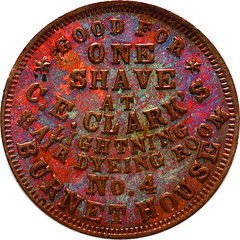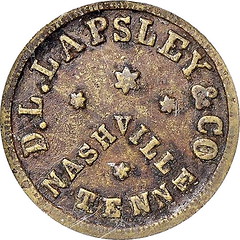
PREV ARTICLE
NEXT ARTICLE
FULL ISSUE
PREV FULL ISSUE
AFRICAN-AMERICAN ISSUERS OF CIVIL WAR STORE CARDSJohn Ostendorf published a nice article on African-American Issuers of Civil
War Store cards in the Fall 2014 issue of The Civil War Token Journal, the official
publication of the Civil War Token Society (CWTS). With permission, here's an excerpt. Many
thanks to John for forwarding the text and images. -Editor
The very first tokens issued in the United States by African-Americans were Civil War tokens. It is arguable as to who the first issuer was, but as I will demonstrate in this article, it was most likely either Charles E. Clark of Cincinnati or McKay & Lapsley of Nashville in 1863. From the antebellum period until the late 19th century, barbering was primarily a black profession. Also called, "color line barbers", these barbers served only white men and did not allow fellow blacks to patronize their shops for fear of losing their white customers. Barbering was dominated by black men due to an aversion by whites to a trade involving personal service and an attitude by whites that a profession of servitude was appropriate for black men. In fact, every Civil War store card issued by a barber was issued by an African-American.
Many black barbers were actually mulattos, men who had a white father, but were treated as blacks. These men may have had an advantage in that their white fathers freed them and gave them financial assistance in starting their business. The racial classification was not consistent in its usage, so often a person is listed as 'mulatto' in one record and as 'black' or even 'colored' in another record. It can be safely said that very few 19th century store cards were issued by African-Americans. The following eight merchants, four from Cincinnati and four from Nashville, represent the earliest store cards issued in the United States by African-Americans. It's a lengthy article with great information and illustrations, including
contemporary newspaper ads. I've had to cut details on the particular issuers, but here are
John's descriptions of life in their cities. -Editor
Cincinnati issuers:
There was a general hostility toward blacks in Cincinnati and mobs of white men were known to terrorize the black community in the 1860s. After Confederate raids and Union losses in Kentucky in 1862, Cincinnati prepared fortifications to defend against a Confederate attack. Among those helping in the defense of the city was the Black Brigade of Cincinnati of which two Civil War token issuing barbers were members. Nashville issuers:
Despite the occupation of federal troops, slavery was not eliminated by their occupation nor the Emancipation Proclamation that affected only areas under rebel control. Slavery did not officially end in Nashville until early 1865, although its practice was minimal by this time. At first I had to wonder how John knew that these issuers were African-American,
since the name and profession alone is not definitive. But he's done his homework, citing U.S.
Census record in his citations. Great detective work! -Editor
For more information on CWTS, see:
Wayne Homren, Editor The Numismatic Bibliomania Society is a non-profit organization promoting numismatic literature. See our web site at coinbooks.org. To submit items for publication in The E-Sylum, write to the Editor at this address: whomren@gmail.com To subscribe go to: https://my.binhost.com/lists/listinfo/esylum All Rights Reserved. NBS Home Page Contact the NBS webmaster 
|



